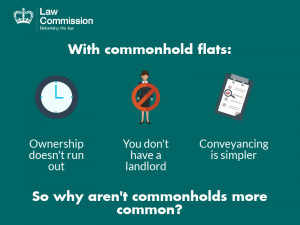Freehold and leasehold describe two different ways of owning property. It is important to understand which applies to your property as they come with different rights and responsibilities.
Freehold property
Freehold means you own the house and any other buildings, together with the land it is built on. Most houses are freehold, although there are exceptions, such as shared ownership properties.

Advantages and disadvantages of freehold
You do not have to pay any service charge, ground rent or any other landlord charges.
You own the property until it is sold (or repossessed by a lender).
You do not have to get consent from the freeholder or other leaseholders in order to make changes to the property (you may need planning permission).
You will be solely responsible for maintenance and repairs to the property.
Share of freehold
Share of freehold is used for flats and maisonettes, where at least half of the leaseholders in your property agree to buy the freehold. You will need to agree how to manage funds and communal areas, such as through a managing agent. However, this can give the residents more control over costs and management than leasehold.
Commonhold
Commonhold is an alternative to share of freehold or leasehold for owners of flats. In a commonhold, the owners of units form an association to own and manage communal parts of the building.

Commonhold ownership is relatively new, having been introduced in England and Wales in 2002. According to the Government it is currently considering changes to commonhold. For up to date advice on commonhold, contact a specialist conveyancing solicitor.
Help with buying or selling a freehold property
If you are buying or selling a freehold property you should instruct a specialist conveyancing solicitor or licensed conveyancer. Most specialists will be able to provide indicative freehold conveyancing quotes on their websites or over the phone.
Leasehold property
A lease is an agreement between you and the freeholder that you will own the property for the period of the agreement. Property owned in this way is called leasehold. Leasehold ownership is the most common form of ownership for flats and maisonettes. You own your flat or maisonette but not the building it is in. Less common are leasehold houses, where you own the house but not the land it is built on.
Advantages and disadvantages of leasehold
The freeholder is responsible for maintaining the land and communal parts of the building.
You need to check the lease length and be aware of its expiry.
The freeholder will charge for extending the lease, although disputes can be taken to the Leasehold Valuation Tribunal.
It is difficult to obtain a mortgage for properties with short leases.
The value of the property will decrease with the length of the lease remaining, which could make selling or remortgaging difficult.
There will usually be service charges and/or ground rent to pay, which may increase.
Help with buying or selling a leasehold property
If you are buying or selling a leasehold property you should instruct a specialist conveyancing solicitor or licensed conveyancer. Each lease is different so it is important to seek advice from specialist conveyancing firms, such as Sam Conveyancing.
As each lease is different, fees may vary for leasehold conveyancing work depending on the complexity of the lease.


